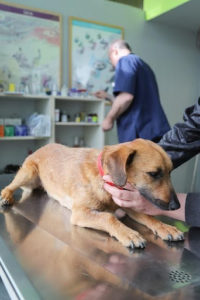
National Immunization Awareness Month or NAIM is an annual observance that discusses the importance of pets staying vaccinated throughout their lives
If you weren’t aware that it’s Immunization Awareness Month, then no worries. Our team at Mount Carmel Animal Hospital is here to inform you and keep you up-to-date on the latest and most significant information regarding cat and dog health. Has it been a while since your pets had their vaccinations? We stress the importance of you taking care of this promptly and consistently. Vaccinations are vital to your fur babies! Here is what you should know about vaccinations related to DHPP/Felocell, rabies, Lyme disease, and Leukemia.
Why Vaccinations and Immunization Awareness Month Matters
Vaccines trigger protective immune responses and prepare the immune system to fight future infections. Vaccines stimulate antibodies that identify and destroy disease-causing organisms that enter the body. National Immunization Awareness Month or NAIM is an annual observance that discusses the importance of pets staying vaccinated throughout their lives.
Core Pet Vaccinations
- DHPP/FVRCP Vaccinations: DHPP is a vaccine that prevents canine distemper, parvovirus, and parainfluenza. The DHPP also contains two types of adenovirus. At 8, 12, and 16 weeks dogs should receive their DHPP vaccine. A year after that, your canine companion should receive it again. Then, they will need another DHPP vaccine every one to three years. The FVRCP vaccine prevents feline viral rhinotracheitis (FVR), a herpesvirus. It also protects against feline calicivirus, which causes upper respiratory infections and oral disease in cats. The FVRCP vaccine also prevents Feline panleukopenia (FPL). This disease is also known as the feline parvovirus, a potentially deadly virus. Cats receive their vaccine series the same way that dogs do.
- Lyme Disease: Lyme disease is endemic or regularly found in Maryland and Pennsylvania. Dogs should have a two-shot series and then a vaccine for Lyme disease every year after. Lyme disease causes many health complications such as kidney failure, cardiovascular issues, and joint disease, which is why pet owners should take this seriously.
- Rabies: September 28th is World Rabies Day! Rabies is a zoonotic (can be spread from animals to people) and fatal disease. Maryland and Pennsylvania require by law that pets have their initial rabies shot at three months old. As with other vaccines series, after this, another vaccination should take place a year later and then one to three years after that.
Lifestyle Pet Vaccinations
- Leptospirosis: We define Leptospirosis as “a zoonotic bacterial infection that can affect your dog’s liver, kidneys, central nervous system, and eyes.” Leptospirosis can be deadly. Your dog can get leptospirosis by drinking in puddles, streams, or any other body of water that carries urine from an infected animal. This vaccine is suitable for dogs that like to spend time outside. Puppies should receive a series of vaccinations and then annual vaccinations every year.
- Bordetella: Bordetella is a bacterial upper respiratory infection. This highly contagious disease is best for dogs that spend a lot of time with other dogs at parks, kennels, groomers, or anywhere else a lot of dogs frequent. Puppies will need a series and then annual vaccinations every year.
- Canine Influenza: Canine influenza is a viral upper respiratory disease. This virus can make affected dogs very ill and spread with ease from one dog to another. Just like Bordetella, dogs that spend a lot of time in congested areas should get this vaccine. Also, like Bordetella, puppies should get a series followed by annual vaccinations.
- Leukemia: Feline leukemia or FeLV can compromise a cat’s immune system, make the body more susceptible to other diseases, and cause blood disorders. This illness is contagious among cats through contaminated saliva, particularly by sharing a water bowl. Cats that spend time outside and can come into contact with other unvaccinated cats should get this vaccine. Kittens should receive a series of vaccinations followed by a booster shot every year.
Here at Mount Carmel Animal Hospital, We’ll Treat Your Pets Like Family!
Mount Carmel Animal Hospital has been serving the Northern Baltimore/Southern York community for over 30 years and is proud to be an independently operated, small animal practice committed to excellence in veterinary medicine and client service. From grooming to wellness services, along with Canine Life Skills Training Courses, and surgical procedures, we have the expertise that will best serve the needs of you and your pet. Contact us at 410-343-0200 and follow us on Facebook!
